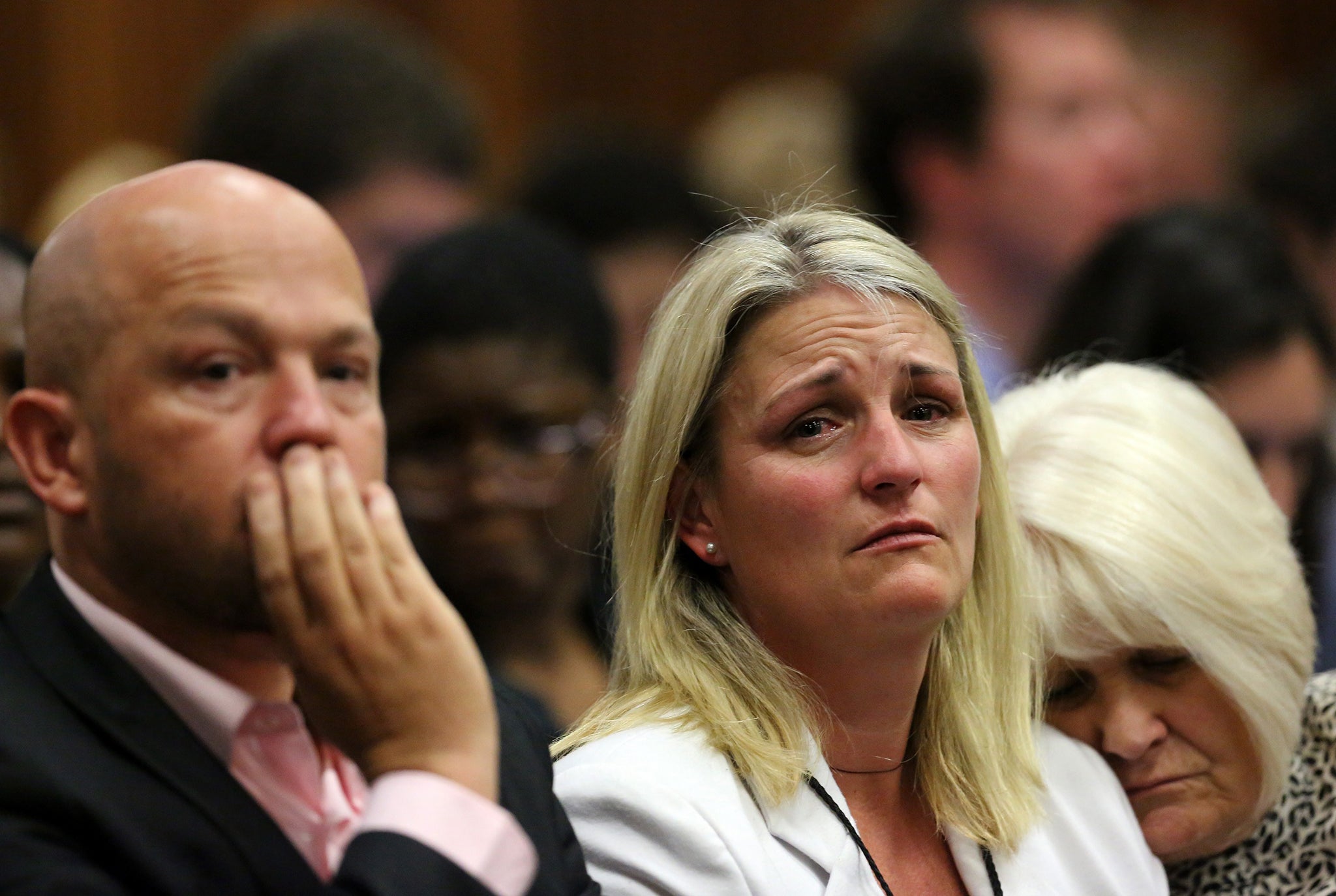The killing of Reeva Steenkamp made it clear that no woman can presume to be safe in her own home
Deaths of women at the hands of the men closest to them is a global phenomenon

Your support helps us to tell the story
From reproductive rights to climate change to Big Tech, The Independent is on the ground when the story is developing. Whether it's investigating the financials of Elon Musk's pro-Trump PAC or producing our latest documentary, 'The A Word', which shines a light on the American women fighting for reproductive rights, we know how important it is to parse out the facts from the messaging.
At such a critical moment in US history, we need reporters on the ground. Your donation allows us to keep sending journalists to speak to both sides of the story.
The Independent is trusted by Americans across the entire political spectrum. And unlike many other quality news outlets, we choose not to lock Americans out of our reporting and analysis with paywalls. We believe quality journalism should be available to everyone, paid for by those who can afford it.
Your support makes all the difference.Amid the deluge of comment that Oscar Pistorius unleashed when he fired those four "zombie stoppers" through that locked bathroom door, it is worth pausing to remember that Reeva Steenkamp died because her lover shot her.
The fact that the judge did not find Pistorius guilty of murder does not change this fact. Nor does it alter that what happened at the wolf hour in that quiet, utterly secure housing estate is something that all of us all over the world recognized. The deaths of women at the hands of men who are closest to them is a global phenomenon. The pattern – which if the judge had found Pistorius guilty of murder we could have named femicide – is chillingly familiar.
In South Africa, violence against women has its own particular shape and colour, and the killing of Reeva Steenkamp made it absolutely clear that no woman, no matter how privileged, can presume to be safe in her own home. South Africa has extremely high levels of violent crime – this is what we are known for 20 years after the end of Apartheid. However, the most lethal threat that women face is not the stranger in the street. It is not an armed and dangerous intruder – that figment of a paranoid imagining that Oscar Pistorius apparently feared so abjectly. It is the man she loves and lives with; a woman is killed by her intimate partner every eight hours in South Africa.
That is certainly something that should make us pause. Again. Think about male violence against women. Again. Wring our hands. Again. As will happen the next time a woman is murdered in her own home. And the next. And the next time a beautiful woman is killed and the world is transfixed, mesmerized.
It is this fascination with the surface beauty of Reeva Steenkamp, the silent cypher of the female body that feeds into a culture – and specifically a media culture – in which women are so easily, so silently erased. We should also look closely at this circus of a trial because there is a great deal that happened in the reporting on it that contributes to a culture that objectifies women and amplifies the careless, macho swagger of men with hair-trigger tempers and a greatly diminished capacity to think about the consequences of their actions.
This domestic killing was, in the end, so depressingly commonplace that it is hard to make meaning out Steenkamp’s homicide. Epidemic levels of violence against women are not treated as evidence of a pathological social order, rather each death is treated as something unique, something shocking. Something new. Yes, each dead woman loses her one and only life. Yes, each bereaved family loses that uniquely beloved person, as was made so clear in the bereft expression on June Steenkamp’s face. But there is a pattern of violence, a grammar to it, which could, if the political and social will was there, be read and understood and contained.
Pistorius’ fame has meant that the banality of the evil of this crime, the thuggish stupidity of a heedless man’s violence, has been obscured by the cheap, shallow glitter of celebrity. Celebrity elevated Pistorius above every other man who killed his girlfriend on that Valentine’s Day, and every other day before and after.

Although Pistorius was charged with the premeditated murder of Steenkamp, this trial was never going to be a way of addressing the systemic nature of male violence. It was never going to be away of addressing the fact that Pistorius was not exceptional. Despite his sporting achievements, he was just one more ordinary South African man whose "negligence", as the judge called it when she found him guilty of culpable homicide, resulted in Steenkamp’s agonising death.
There have been numerous attempts to read Pistorius as an emblem for South Africa. A simplistic reading of a crippled country that somehow made it through apartheid, the worst kind of adversity, to become a global hero only to fall in the final reckoning.
But this is to misread both Pistorius and South Africa. The killing of Reeva Steenkamp was a triumph of brutality and the kind of heedlessness that violent men have always used to, in retrospect if ever asked, justify their actions. South Africa’s deliverance from the evil of apartheid was not a miracle – it was a considered and thoughtful exercise of (mainly) men who could think and consider and compromise for the greater good. Pistorius seemed to do no thinking at all. He certainly did not speak to Reeva in those last fatal minutes. If there had been consciousness, relatedness, Pistorius would have asked Steenkamp if she too had heard a noise. That one question would, if his abject terror of an armed intruder was valid, have saved her life.
If he had been able to ask a question and wait for an answer then none of this would have happened. But that would be outside of a construction of a fragile but lethal masculinity – one that is much lauded in popular culture – that shoots first and asks questions later. Asking questions and waiting for answers requires thought. It is thought that stops us from killing each other.
If we pause to think of her – and for the all the women she is emblematic of – then we can honour her by making sure that instead of simply acting out on emotion or impulse violent or aggressive or thoughtless men learn how to filter emotion – fear, anger, jealousy – through the complex ethical and cognitive processes of the mind, thus enabling those most admirable of human capacities, empathy and non-violence.
The default to extreme and paranoid violence, whatever its psychological origins, has been so dangerous for women and children for so long in this country. Perhaps if Pistorius had been able to think through the surge of adrenalin or fear or rage or whatever it was that drove him to fire those neatly clustered shots, Reeva Steenkamp would be alive today.
Margie Orford is a novelist, president of South African PEN and the patron of Rape Crisis in South Africa
Join our commenting forum
Join thought-provoking conversations, follow other Independent readers and see their replies
Comments